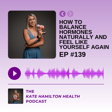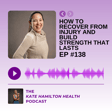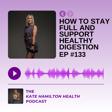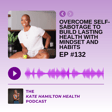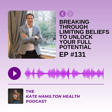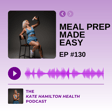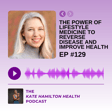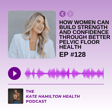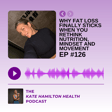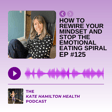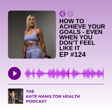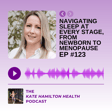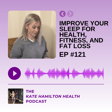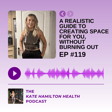Introduction and Guest Excitement
00:00:08
Speaker
Hello, everyone, and welcome back to another episode of the Kate Hamilton Health Podcast. So for anyone who doesn't know, I actually record these intros after I've just interviewed the person that I'm speaking to.
00:00:20
Speaker
And I think you'll notice when I am absolutely buzzing after a conversation. And that is exactly how I feel right now. I have just had a conversation with David Ammerland, and this is what you are going to be listening to today.
00:00:34
Speaker
And it was the most... fascinating conversation I've had in a long time. Absolutely amazing.
Balanced Health and Longevity Approach
00:00:41
Speaker
And I feel like he has just scientifically backed up everything that I do with my work.
00:00:48
Speaker
It was just so refreshing to talk to someone who talks balance, common sense, but also in the context of health and longevity. So really what we talk about is ah about living an intentionally balanced and healthy lifestyle so that we can live longer and live better.
00:01:09
Speaker
but not in an extreme way like what we're seeing all the time on the internet lately of, you know, these doctors on the internet telling us that we have to be, and it's not all doctors, but i'm just talking about these extreme guys that are out there, you know, and because they've doctor before their name, everyone freaks out that we should be cutting out these things. We have to be doing these things and everything's so extreme. And David is so different.
00:01:29
Speaker
He takes this balanced, realistic approach that's backed up by science.
Personalized Fitness and Longevity
00:01:34
Speaker
He is a fitness expert and author of Built to Last, the ultimate guide to sustainable fitness and longevity.
00:01:41
Speaker
His philosophy is rooted in the idea that fitness should be designed to last a lifetime. So he challenges traditional extreme fitness regimes, promoting a personalized, adaptable approach that fits everything.
00:01:52
Speaker
and individuals life, body and goals. And not just in relation to fitness, in relation to whole lifestyle. Drawing from research in biomechanics, neurochemistry and longevity, David's methods focus on sustainable health, strength and cognitive sharpness.
00:02:08
Speaker
And this is a huge part of it as well. How much exercise and healthy lifestyle and getting that balance right is extremely important for our cognitive health.
Cognitive Health through Exercise
00:02:17
Speaker
His book provides a science backed roadmap for individuals at all fitness levels, emphasising consistency, smarter training and injury proof strategies.
00:02:28
Speaker
So in this conversation, you know me at this stage, we talk about everything. okay We talk about walking, we talk about the importance of nature, we talk about higher intensity exercise and what happens to the brain when we do that. We talk about resistance training and how important that is not only for muscle health, but bone health and cognitive of health.
00:02:45
Speaker
We talk about journaling and its benefits. We talk about our automatic habits, the concept of motivation versus living that intentional life. Is motivation a thing? Do we need to rely on it?
00:02:56
Speaker
What about habits and structure? What place does that have in living this intentional life? And where does creativity fall into this also? I've absolutely loved it. I have gained so much from this conversation and I know you will too.
David's Journey and Human Behavior
00:03:09
Speaker
So without further ado, here is the podcast episode with David Amarillo.
00:03:16
Speaker
David, welcome to the podcast. I'm thrilled to be here. I'm actually excited to see where the conversation takes us. Yeah, I'm really, really excited to chat about everything we've kind of planned to chat about and anything else that kind of pops up along the way as well.
00:03:28
Speaker
But before we get into our conversation, do you just want to tell everyone a little bit about who you are and what it is that you do? Absolutely. And you know, every time people ask me, I would say it depends who's doing the asking.
00:03:38
Speaker
I've had a very varied career from a business perspective. I've trained as a chemical engineer. I use the knowledge of mathematics to write books on search and consult on the subject and digital marketing and business and branding and decision making, using a lot of neuroscience, which was cutting edge of the time.
00:03:55
Speaker
Intentionality, how we live an intentional life, which is a lead off from that. And now built to last, which is about health and the issues we face. And in all those fields, essentially what drives me is is us.
00:04:08
Speaker
Why do we behave the way we do? Or how do we understand what it is we must do? Why don't we do the things we should do? And why do we do some things we shouldn't do?
Brain and Body Interaction
00:04:17
Speaker
So that's always been the key that actually kind of drives me forward to peel back the layers and see what science has to say about this.
00:04:25
Speaker
That's fascinating. amazing So you're looking at everything from like a scientific perspective, how we do what we do and how we don't do what we want to do and Yeah, I mean, everything we see and everything we do has an explanation, which is based on the fundamental substrate of our brain and body and the way our brain and body interacts with the external world or in the case of digital marketing and business, et cetera, the interface we actually use.
00:04:49
Speaker
And once we start to understand that, then we'll begin to understand our own operating system a little bit better, which means that we can then begin to understand that behavior, where it goes right and where it doesn't.
00:05:00
Speaker
go so well and that allows us then to begin to try and fix it a little bit so we get the outcomes that we want so that's that's my angle my fitness background i've been training in martial arts since i was 13. i've got three black belts in three different martial arts i competed for 10 years at an international level as well as nationally i still exercise every day so that's in a nutshell that's my journey Do you still train and practice mar martial arts to this day? well What does your exercise regimen look like now? what kind When you say I exercise every day, is it a mix of different things? What do you find works well for you?
00:05:36
Speaker
Like everybody else, I'm driven by my own specific emotional needs on this. So there are specific things which I do to meet those targets in terms of how I want to look and how want to feel.
00:05:47
Speaker
But then i put in there everything that I know from exercise science. So I do a mix of resistance workouts, I do stretching, I do aerobic workouts, and then I do mobility workouts. And sometimes I do all those things in a single workout.
00:06:00
Speaker
which is not so good if you're chasing specific targets, but it's amazing if you're looking for functionality and the way your body actually moves and how you feel
Goal Setting and Fitness Outcomes
00:06:08
Speaker
inside. I love that because I think quite often I get a lot of questions about the health and fitness and the answer to most questions is always it depends because it depends on your goals. It depends on your circumstances. It depends on your everything, you know, and I think we often don't really think about our goals. We're like I just need to exercise because it's something I need to do and what exercise is best. And that's what a lot of us start with.
00:06:29
Speaker
And knowing your goal is really, really, really an important part of it, isn't it? Yes, absolutely. I'm so glad you said that. It's the one thing we don't think about. Usually what happens, we have this kind of preconceived notion of some kind of leaderboard where there's a best exercise to do and a best thing to try and achieve.
00:06:47
Speaker
And we forget that if we don't know who we are, if we don't understand that, then we don't really understand why we do things. And then that doesn't work out for us in the long term.
00:06:57
Speaker
We lose interest, we lose motivation, we don't get the results we see, and we don't understand why not, and our focus isn't there. And we know that if from the emotional context for us is right, then even the little things we do actually give us better results. And there are studies on this. They actually showed that people who, you know, they looked at resistance trainers who use a mirror,
00:07:20
Speaker
And we think it's a vanity thing because you're using a mirror to lift weights and watch your muscles move. But essentially in that attention, that visual attention we pay to the muscle as it moves is expressed in a 13 to 15% better outcome in terms of strength and muscle growth.
00:07:37
Speaker
as opposed to just doing it blindly, just going through the
Emotional Intent in Exercise
00:07:40
Speaker
motions of lifting something. So the attention we pay in our mind, the emotional content that we put into what we do, actually gives back in terms of how the body responds to it.
00:07:50
Speaker
And that's the mind-body connection from a neurochemical perspective. I never really thought about it from it yeah from a fitness perspective. I work with a lot of women around weight loss in particular and a huge amount of the work that we do is on that why.
00:08:05
Speaker
And what's become really, really clear to me and in recent years is just how busy we are and how automatic we are and how much we are not... listening to ourselves at all because there's so much noise going on around us. There's so much noise going on in our heads and there's so much chatter that we don't actually know what we want. We don't know what our body needs.
00:08:25
Speaker
So in your opinion, where do we start when it comes to what does my body need? And I'm stressed, I'm busy, I'm doing nothing for myself now. what Where do I start? Before I even answer that, I'm just going to add add an extra thing to what you just said, because I love what you said about paying attention to what we do, even on something as weight loss.
00:08:42
Speaker
Back in 2003, the University of Harvard ran a study where they looked at hotel maids doing hotel work, which is cleaning beds and you knowre doing the bed linen, cleaning rooms, and changing the whatever's in the room.
00:08:56
Speaker
And they used 60 different hotel maids from three different hotels, and they're doing the same kind of work. And they had three groups, essentially. One was a control group and the other two were the test subjects.
00:09:07
Speaker
And this is what they did. They said to the control group, we're just starting to see what you do each day so we can get a better idea. And then they gave to the other two groups and told them, they showed them diagrams, they showed them films and they said, you know, what you're doing essentially for you guys is exercise. I know it doesn't feel that way, but it actually, you're exercising every day, even though you don't understand it.
00:09:25
Speaker
So then they allowed them to, they carried out biomarker checks on them to see about, hip to waist ratio and muscle and, aerobic capacity, all those things. And then they checked back 12 weeks later.
00:09:36
Speaker
And this is what they found the group that had been told. that all they were doing is work, showed no difference in their biomarkers, but the other two groups showed it a 15% improvement across the board.
00:09:49
Speaker
They had lower blood pressure, they had lower body fat ratio, they had better waist to hip ratio, they had better muscle tone, simply by being aware of the impact of what they were doing on themselves.
00:10:01
Speaker
It's mind blowing. It's being intentional. as everything Yeah. But like consciously doing what you're doing and being present in what you're doing. Yeah, it's like you're telling the brain to prioritize specific things in terms of the adaptation that will carry out and the energy required to carry out that adaptation within the context of what you're doing.
00:10:20
Speaker
So if you're doing it blindly, if you do it long enough, sure, you'll see some improvement, but it'll sort of have a ceiling. And if you carry it out intentionally, as you say, Then you'll see a marked improvement in a fairly quick time, which is amazing.
00:10:35
Speaker
And that comes down onto your question earlier, you know, how do we start if you don't know how to start?
Walking and Cognitive Benefits
00:10:39
Speaker
I always tell people, you do what you feel is easiest for you to do. What is it that you actually like doing? Do you like cycling? Do you like walking? Do you like running?
00:10:46
Speaker
Do you like dancing? Whatever it is, be like water. Do the thing that feels energetically easier to do. And if you do that, that's your start because you're doing something which you have an emotional connection to. it That's why you're predisposed to do it.
00:11:03
Speaker
It makes you feel good. Then it kicks off a biofeedback loop between your body and your brain. Your body does something. Your brain feels good. Your mood changes. You become sort of happy in doing it. And then you're inclined to do more of it.
00:11:16
Speaker
And that becomes your first step towards something else because as you change, your horizons broaden. And I think we make the mistake of thinking we have to have it all figured out and we get overwhelmed. Whereas really, if you actually just take that first step, the next step kind of presents itself as you get going.
00:11:30
Speaker
And with beginners, I will very much start with just get out for a walk. And people will say, how much do I need to walk? And I'm like, it doesn't matter. Just be someone. who walks every day. I always use this analogy where I compare us to dogs. I'm like, our dogs need to be walked every day.
00:11:45
Speaker
We need to be walked every day. It doesn't matter if it's for five minutes or 90 minutes or whatever. Just like make that part of your identity, someone who walks every day. And I really do believe that that's the first step.
00:11:56
Speaker
Yeah, absolutely. I mean, it seems so easy. doesn't feel like exercise and has a multitude of layers there. First of all, obviously it's a physical aspect. but A body walks, a feet move, shit the tarmac and things change inside us neurochemically and biochemically.
00:12:12
Speaker
both in our body and brain. And we have studies now that show that if we walk or if we run, and it doesn't matter whether we walk or run, the impact on global cognition, the total number of variables that go into what we call cognition in our body, you know, it's emotional regulation, executive function, balance, coordination, how we pass sensations from the external world through our body to create emotions.
00:12:37
Speaker
They improve. And this is the only exercise that has impact on global cognition. If we lift weights, for instance, with the resistance training in all its various formats, we see an improvement in executive function, which is about task-orientated goal-orientated behavior and how we prioritize things.
00:12:54
Speaker
But not global cognition. And the reason for this lies in our ancient past. You know, when in the past when we had to run or walk, we did it either to get food or avoid becoming food. So you need higher brain functions for that in order to strategize.
00:13:07
Speaker
But if you're doing any other kind of exercise, you don't need to be as analytical. So the brain then saves us those resources so for executive function, which allows us to maintain our focus on the task.
00:13:19
Speaker
but not global cognition, where we become really hyper analytical about the environment and our body in it and how it moves and how it connects. So it's an amazing thing to do. It it actually delivers so many positives.
00:13:31
Speaker
Yeah, that's really interesting to hear kind of that scientific side of why it feels so good for our mental health as well. I remember seeing a picture somewhere of like two brains, a brain after sitting for hour and a brain after walking for an hour. Now, I don't know maybe this could all have just been made up, but ah it was like you could see these in these scans that the brain like actually would like, you know they lit up different parts of the brain or whatever, but that's is this A whole different part of the brain comes alight, if you like, after an hour's walk. Now, it doesn't have to be an hour. I'm just using that as an example. But like I find I get much more creative after walking and like but also after yoga. But it's the same thing, I suppose, yoga and walking. You're moving your body in that in that kind of deliberate way. But I would get much more creative after walking.
00:14:15
Speaker
And I find it my best way to meditate or be present or get out of my thoughts that like I will never listen to music. I'll never listen to a podcast or anything like that when I'm walking. And I don't think there's anything wrong with people doing that if they want to. I just don't.
00:14:29
Speaker
So I go out and I live in a really nice place in the countryside where I can go by the sea and it's beautiful. And I find that connection with nature really, really strong. And I find that connection with myself because i I'm very stressed and busy. I find it hard to sit still or like regulate myself.
00:14:45
Speaker
but a walk will sort that. I'll do that to get that clarity rather than it being for physical fitness that ah like 10 years ago, I'd have been like, oh I have to go for another walk.
00:14:55
Speaker
You know, I have to hit my 10,000 steps. Whereas now it's not, it's like I need my walk so that I function properly. Yes, you touched on something else when you said you sort of need to be out in the environment feeling the sensations that it sort of inputs on you.
00:15:09
Speaker
There's an effect which in Japan, they have a specific word for it, which I can't remember now, which is called forest bathing. And that is when you're out in the nature and that the sensations from the environment around us engage all the different centers of the brain so that our brain becomes more alive it processes those things.
00:15:27
Speaker
And that correlates to how we feel present in our body if we go for a walk in the woods or out in the park or you know walking by the sea. And these things change the biomarkers that we have inside us. They change the in internal environment we experience.
00:15:43
Speaker
They change it how? We see the blood pressure drops, heartbeat becomes a little bit slower, breathing becomes a little bit deeper, um lungs open up, circulation improves. So it has a strong feel-good factor.
00:15:54
Speaker
which you may get with other activities like yoga, which you mentioned, martial arts, dancing, but not to the same extent because those are in a contained environment. The brain is engaged for sure because the body moves in three-dimensional space and has to control it through its awareness of body schema and where everything lies.
00:16:12
Speaker
But when it actually comes to nature, we have to process those external signals, which are wind speed and temperature and smells and scents and sights and sounds all at the same time.
00:16:25
Speaker
So the brain does light up a little bit more and that is then is reflected in the neurochemicals which flow through our bloodstream, in the neurotransmitters that go through our brain and how that makes us feel in terms of our mood and the reward system that's activated and serotonin, which makes us feel good and dopamine, which kind of motivates us.
00:16:45
Speaker
Yeah, so get outside, people. It's important. It's harder for us in Ireland when it's raining, but you know what? Get out in the rain anyway. We can't wait for the weather. We just need to be outside as much as we can. Like, you know, I know life can be so busy and it can be very difficult, but even just a few minutes.
00:16:59
Speaker
I have a friend who lives in Finland and they have terrible weather her and she's out. And he says, you know, he just goes for 15, 20 minute walk every day. What feels to us like a snowstorm, he told me just calms him down. It centers him.
00:17:11
Speaker
And I totally get what he means by that. It's become part of his identity in in how she does it. Yeah. You just become someone who who does it every day. It doesn't have to be walking. can be cycling or swimming or jogging or whatever it is that you enjoy.
00:17:24
Speaker
i presume is it that will give these same effects that you've explained? Yeah, as long as you're out in in nature. Of course, there's ah sort of a threshold. If you go past a certain level of exertion, then the brain has to now prioritize.
00:17:36
Speaker
What is it going to pay attention to? So if you are
Exercise Routine Diversity for Health
00:17:40
Speaker
sprinting or trying to beat your time over a 10 kilometer race, for instance, and you're really pushing hard, so you're really pushing to the limit of your capabilities, well, then the brain has to focus and it has to divert resources to the muscles to...
00:17:51
Speaker
where you pay attention to the cadence of your run, the sort of rhythm of your breathing, all those things. So that narrows down perception now, and it makes you almost agnostic as to whether you'd be doing it a treadmill or doing it outside because it shuts down the destruction of all the other things.
00:18:07
Speaker
Just for context, right, in my own life, I had been training towards a 10K race. Okay, so I was a new runner, never never really that into running. Started running in September. Did my first 10K race in April.
00:18:21
Speaker
And it was fantastic. So it was a really bit good challenge. It was really good for me. And I i was really happy that I built my fitness levels up to that degree because I'm not naturally a runner.
00:18:31
Speaker
But I lost that... connection to nature a little bit. I lost that. I lost a little bit of my creativity as well in my spark. Like it's just like something was missing. And i was only talking to my husband about it the other day. i was like, we need to go hiking in the mountains a bit more.
00:18:46
Speaker
Like I used to do that every weekend. And then we were prioritizing getting the longer run in and, you know, running just took over. And as much as I enjoyed running and a feeling afterwards, you don't get that same connection.
00:18:57
Speaker
but then That's so interesting. And that is because obviously the brain has to focus on keeping your body moving and alive. Yeah, it prioritizes. Whatever you pay attention to, i mean, it comes back down to the example we gave about the hotel maids, the Harvard University research.
00:19:11
Speaker
Whatever we pay attention to, the brain prioritizes that over everything else because it thinks that's what's important. So if you're doing yoga, for instance, and you know you pay attention to your breathing, you pay attention to how your body moves in terms of angles of freedom of movement and range of motion, these are the things it actually prioritizes because we are in that moment.
00:19:31
Speaker
You go and lift weights, Again, there's obviously a certain range of motion, of freedom of movement involved in that, but the focus is on building strength, building strong muscles, building strong tendons, making the joints stronger to take a specific load.
00:19:45
Speaker
And it prioritizes that. and This comes down to also something that I keep in mind, you know, sometimes I train twice. in a day and do something in the morning and something complimentary in the evening. And depending on what I do, the second training session may negate part of the effects of the first.
00:20:01
Speaker
So if I go and do strength training in the morning, for instance, and then the evening, and i might do bug work and bug work has a strong cardiovascular component. So i'm punching a heavy bug for sure. I'm building up strength and building up power, but on a knowing basis, something that I'm willing to accept to the detriment of building extra muscle.
00:20:19
Speaker
This is exactly why bodybuilders and runners are at opposite ends of the scale because it's completely different goals. But also really back to your original point then that for most of us who just want to be healthy, live longer, live better, getting a variety is really important, isn't it? Unless we have a specific goal that we're trying to like build a decent amount muscle or that we're working towards a marathon or, you know, whatever the specific goal is. If we don't have a specific performance or composition goal, variety and balance is going to be the healthiest option for us.
00:20:49
Speaker
Yes, do everything. That's what I tell people. Do, try everything. There's no fail and there's no problem in trying as many things as possible and seeing how they feel for you. And here's what happens when we do that.
00:21:01
Speaker
We may not get to a specific, in my opinion, artificially inflicted upon us look and how we're supposed to look physically. But functionally, we're going to feel great. We're going to be able to do whatever we want.
00:21:13
Speaker
We're not going to feel significant aches or pains as we get older. We're not going to lose the ability to control our body as we get older. And the most important part, we'll actually feel good living inside ourselves, which is absolutely critical to feeling happy.
00:21:28
Speaker
No matter what little mini goals we have along the way on our path in life, at the end of the this is what's most important. And I couldn't imagine talking to anyone who doesn't want to live well for as long as possible, feel good in their body for as long as possible.
Importance of Resistance Training
00:21:41
Speaker
Let's talk a little bit about resistance training then, because I do a lot of talk on this, particularly with women, especially I work with women. I think everyone I work with is over the age of 30. So we're losing muscle mass by the decade now from the age 30 onwards.
00:21:54
Speaker
And it's really, really important that we're using it so we're not losing it. I talk a lot about, you know, busting these myths on you can't build muscle after 40 or when you hit perimenopause. And I talk about all of these things and I'm like, that is not true.
00:22:07
Speaker
That is not true. You definitely can. Again, depends on your goal. But resistance training is something that is becoming so much more mainstream, which is fantastic and everyone is aware of how important it is.
00:22:21
Speaker
It has to be the one non-negotiable for us to to live healthily as we age. What are your thoughts on resistance training and how much needs to be incorporated into someone's week? There's so many myths about it, you're right.
00:22:34
Speaker
And also so many fears, particularly from women. They feel that if they do resistance training, they're going to get bulky and they don't like that look. And we know this is a myth. This is not how it works.
00:22:45
Speaker
We do resistance training for a simple reason. We want to have control of our body on the three-dimensional plane of the planet, which is pulling us down through gravity. So we need to have that freedom, that capability.
00:22:57
Speaker
But for women in particular, also men, but especially women, it has other benefits. And I'll explain these first and come back to the to the core of your question. The benefits are that women suffer from osteoporosis as they get older.
00:23:10
Speaker
And there was a Harvard study done, I think, in 2010. They were looking at osteoporosis and the correlation of ship breaks for older women.
00:23:20
Speaker
and how it affected them. And this is what they found. They found that within six months of their hip break, they had the onset of dementia. And then they went looking into this to find why the correlation was happening. And they discovered that having stronger muscles means you have stronger bones. If you have stronger bones, you have healthier bones. Then healthier bones produce a particular type of neurotransmitter, which helps maintain brain health as we get older.
00:23:43
Speaker
So Becoming stronger physically without having massive muscles is key to both physical health and mental health as we age. It's important for men, but like I said, particularly for women, because the ja of the hormonal changes in the body, which lead to osteoporosis, which has a cascade of other negative health effects.
00:24:03
Speaker
So when it comes to saying, okay, how many times a week should I do it? Obviously it will depend upon so many different factors and it's very hard to be prescriptive and say, oh, you need to do it three times a week and do so much and lift so much weight.
00:24:15
Speaker
It depends on your range and your history and your genetics to some extent, and also your own goals and how you visualize yourself. but truly if we start from a common goal which is to feel that we're in control of our body that it doesn't control us that it doesn't trap us then we're looking for function strength and for that we can do any kind of resistance work as many times as necessary for sure we can do it formally two or three times a week we'll be going to lift weights and we do things like that but even just doing squats which is body weight or push-ups that is resistance training little hops on the spot that is also resistance training
00:24:53
Speaker
yeah Simple things like doing squats while you're cooking the dinner and, you know, just in your kitchen, like to a kitchen chair, if you feel like you need a target using the kitchen counter, because obviously a lot of women don't have that upper body strength to do a full push up.
00:25:06
Speaker
Do it against the kitchen counter. You'll be able to work your way down towards the kitchen table eventually towards that, you know, that we can so elevate that push up. There's so many props in the house. I'm like the queen of this, just, you know, all these different props that we can use to resistance train at home with minimal equipment.
00:25:23
Speaker
I just wanted to interrupt the podcast for a moment to talk to you a little bit about Kate Hamilton Health online coaching. So we have two coaching options available. We have our elite coaching and we have our group coaching service.
00:25:39
Speaker
Our elite coaching service is bespoke individualized coaching, which will help you to finally break free from diet culture with one to one, anytime support from your coach and with access to a safe, supportive community.
00:25:52
Speaker
This is a higher ticket coaching option and the coaching is by application only. If you go to my website, KateHamiltonHealth.com, you will be able to apply for elite coaching through there and we will be in touch to organise a call and to get you up and running.
00:26:07
Speaker
In relation to our group coaching, our group coaching starts on the first Monday of every month. When it's full each month, we do close the doors. With the group coaching is about building the habits, body and energy of the healthiest version of yourself and finally make it stick.
00:26:25
Speaker
We include personalized calories and portions, food lists, recipes, meal plan ideas, step goals, home or gym based workouts, depending on what you want, changed every eight weeks.
00:26:38
Speaker
Mindset work, app access. So that's the Kate Hamilton Health app, which will be your hub for everything. Weekly yoga classes, WhatsApp group community, weekly group Q&A with myself, fun challenges,
00:26:50
Speaker
daily habits form, weekly self check-in, fortnightly check-ins with your coach, a library full of lifestyle guides, a library full of lessons, seminars, and all of this is updated regularly.
00:27:03
Speaker
We have weekly group Zoom calls with myself and the team, regular guest seminars where we get experts on to talk more to you about different topics that we need experts on for. And then we have in-person events twice a year that you will get at a major discount as being a member of the kate Hamilton Health community. As I said, this starts the first Monday of every month. If you go to my website, KateHamiltonHealth.com, you will see when the next group coaching intake is starting for you.
00:27:33
Speaker
So we close the doors as soon as that intake is full or the Monday before the group coaching starts. So usually that last Monday of the previous month. So if you head over to Kate Hamilton Health dot com, all of that information that I've talked through is on the website.
00:27:49
Speaker
You'll be able to book your spot for the next intake there. And I will chat to you all then. Yeah, it makes it fun. And also it takes out what I call the perceived barrier of effort.
00:28:02
Speaker
If we think that, okay, I need to, you know, stop what I'm doing at home, which is important, get dressed, negotiate traffic, find a parking space, have my gear together to begin with, get somewhere, get changed, navigate whatever social sort of politics are in that place where we go to the gym, which is also rife with judgment, et cetera, and then work out.
00:28:22
Speaker
Okay, that's a massive hurdle to overcome for most people. But if you say, okay, going to do a few squats at home, you know, before I do the dishes, or I'm going to those inclined pushups. That is amazing because we incorporate it in our life. It gives us a sense of control. It activates our body throughout the day if we do that. And the signals which we send, the physical signals that we send to the brain, then play an important part in the brain prioritizing.
00:28:48
Speaker
The energy allocation in the body, which will lead to the building of muscles because that's an energetically expensive kind of task. And the body is very careful about how it allocates energy because it doesn't realize we live in a world where, you know, calories are easy to get and hard to get rid of.
Energy Allocation and Adaptive Responses
00:29:05
Speaker
There's so much in what you're saying that I'm just mesmerised by. Like even just to bring it back to the neurotransmitters that are being sent to your brain from resistance training, from your bones to help prevent Alzheimer's. I just think that's groundbreaking. And another reason why this is so important, like you sing from the exact same hymn sheet as I do when it comes to bringing the barriers down and baby steps. Like if if anyone listening is a complete beginner,
00:29:32
Speaker
baby steps, it's never been an easier time to access information, to access a strength program to do at home, to find a personal trainer online to maybe meet and in a gym and let them show you the movement patterns in person so that you learn how your body moves and then long term do that at home when you know what you're doing.
00:29:50
Speaker
Like it's never been easier. I know we've never been busier and we've never been more stressed. But if we can really look at it how important this is. If our goal is to be healthy and live well for as long as possible, this has to be a priority and it's never too late.
00:30:06
Speaker
And if we can make it a priority, it might take a little bit of effort and, you know, reprioritizing. But it's so worth it. It's so easy to get started because we have access to everything.
00:30:16
Speaker
Absolutely. And a lot of you know, you said it's never too late and I'll bring in a study which was carried out in Japan. They have their largest number of non-engineerians, people who live over 90 there.
00:30:27
Speaker
And ambitiously, from my perspective, they picked a few 95 year olds. And they were going to train them to do, to improve their time on a hundred meter dash. And they had a three year training program and they were able to get them from 95 when they started training to 98 of our three year period of our, our carefully regimented training program to actually improve their time on a hundred meter sprint, which means the muscle tone improved their aerobic capacity.
00:30:53
Speaker
I love this. It's just crazy. So that shows that it's never too late. whatever Whenever you start, the body is an adaptive machine. It will actually respond to the signals it gets from the brain, provided, again, back to the study from by Harvard on hotel maids, that we have that focus, which allows us to prioritize it.
00:31:12
Speaker
And if we prioritize it, what does it mean? It means that emotionally, because everything we do is directed by emotions, and then we apply the logical filter to explain it, that emotionally we are actually tied into this. We have thought about it.
00:31:26
Speaker
We don't want to be frail. We don't want to spend are the last few decades of our life battling ill health. We don't want to be trapped in our body. we want to feel capable. want to feel free.
00:31:37
Speaker
want to feel happy, to enjoy the world and life as we want to. And that has to be an emotional response. That's the key to actually overcoming all the other barriers and obstacles that life throws at us. And it throws it everybody equally.
00:31:52
Speaker
But those who circumvent them, those who find ways around the obstacles, have understood that emotional response, that emotion. They have made that emotional connection. They know where they're going. They know their who.
00:32:04
Speaker
And they understand their why. And that helps them focus. What are your thoughts on journaling when it comes to figuring out your goals and your why?
00:32:14
Speaker
and Absolutely brilliant. it's It's a nice technique. It feels very non-invasive. It feels very soft. It's actually hard in the things it throws up. In psychology, it's called distancing. And it allows the brain almost split into two and putting the thoughts and seeing those thoughts come up and examine them.
00:32:32
Speaker
And by examining them, it dampens down a little bit of the emotional impact. It makes it easier to become more reflective and receptive to what we're actually seeing in the pattern and of what we're writing.
Journaling for Motivation and Insights
00:32:44
Speaker
So it helps us understand our own motivation sometimes. It definitely helps us understand our own sense of confusion sometimes. And then we can ask, you know, why am I confused about this? So it's an absolutely amazing tool when it comes to doing that hard work where we peel back the layers of who we are.
00:33:00
Speaker
and try to see why do we behave in particular ways. So the trauma is guiding us to avoid something or what kind of sort of past loxos and specific behaviors which are not very good for us and we need to change.
00:33:13
Speaker
So it's critical and glad you brought this up. We can't change something if we're not aware of it. And back to the point that I made of us, ah so much of what we do is automatic, which is so that our brain can focus on whatever else we need focus on. It's it like it's important. It's what our automatic behaviours there to serve a purpose. But when they start to control us, which is what happens to a lot of us, that's where the overeating happens. That's where the not exercising happens. That's where suddenly we're being dragged around by our lives.
00:33:40
Speaker
because we're not being intentional with anything. And I just think it's so powerful when we put pen to paper. Now, sometimes there can be a lot like lot of layers there and there can be a lot of trauma and people do need to go to therapy for that to help it.
00:33:51
Speaker
But like, start with journaling. See how you go. Start unlayering. let Start peeling the layers. See what's there. Because when you're aware of it, like the things I've written down over the years, feeling like, wow, did I just write that? I didn't know I thought that or felt that. And it's fascinating.
00:34:08
Speaker
Absolutely. Yeah, it is. And it helps us gain perspective from what is going on inside us, which is not always easy to do when all we normally do is focus on how it makes us feel.
00:34:20
Speaker
So if something makes us feel uncomfortable, usually our primary response so is to focus on that feeling of discomfort. and then to reach for some coping behavior. It can be overeating, can be over drinking, can be not sleeping well, it can be personal behavior that's self-destructive in the long term, it can be any of those things.
00:34:38
Speaker
But if we are able to articulate it, Then we begin to sort of see the shape of it and get a grip on it. And that allows us to feel a bit more in control.
00:34:49
Speaker
But also by articulating it, our brain almost splits into two. The part of the brain that feels and the part of the brain that actually now has to articulate what it is that it feels. And by doing that, in a sense, it diverts resources into two areas as opposed to one.
00:35:06
Speaker
and it dampens down the feeling of discomfort which we felt to begin with which is what allows us to feel a little bit better about the process which then helps us feel that we're a little bit more in control of it and things start to get better from there.
00:35:20
Speaker
Well, I love that you put the scientific aspect on this concept because what I call this is the ego and the self. It's the same thing. Yeah, it is. It is. It's a good label, but that's what the brain does. I mean, yeah. yeah It's too different the parts of the brain. Yeah.
00:35:32
Speaker
It's a very smart way of applying our intellect to help us deal with problems, which stem partially from a distant past where, you know, they were designed to
Future Goals and Fitness Journey
00:35:42
Speaker
help us. And to not get stuck there, to be able to kind of stop always. We tend to focus on what we don't want rather than focusing on what we want. So if we start saying, I want to live till I'm 98 and be able to run 100 meters or you know, like do squats or get up and down and just be able to go for a walk, whatever, you know, whatever it is that you want.
00:36:02
Speaker
i Like for me, I like my kid, I had kids all through my 20s. So I'm my kids are getting a little bit older now, i'm like another 10 years. I want to go on as many adventures as I can in the world. I just want to, when I've raised my kids, go travel the world. And I want to be in really good health for that. I want to be in really good shape for that so that I can do whatever I want to do when I'm on these adventures.
00:36:21
Speaker
So that's a really, really strong, like emotional. But I didn't know that 10 years ago. Because I was just so caught in the automatic behaviours and had probably had stuff that I had to work through. A lot of insecurities I had to work through that I wasn't aware of.
00:36:35
Speaker
So once you identify them and you detach from them a little bit, that's where it's important to have the have the goals. And it to be a big, long list, but it's like, why do you want to exercise? Why do you want to eat well? Why do you want to go for a walk every day? Why did you sign up to Kate's coaching program? Why did you, well you know, like, why are you doing this? It's just so important.
00:36:54
Speaker
And it can change over time as well. And sometimes it's okay to be like, I'm just doing this because I want to like lose weight. I just, I want to look better. Like, that's why I started exercising back like eight years ago.
00:37:06
Speaker
just want to look better. But that's okay when you're starting. Your why will evolve as you evolve. Absolutely. And like I'm so glad you said that, you know, because we we tend to think that our sense of purpose has to be some kind of grandiose thing.
00:37:19
Speaker
And it doesn't, as long as it has meaning for us. You know, if you want to get a six pack, for instance, it absolutely means the world to you, then you will actually do it and, you know, you'll get it and you will change and evolve from there. You know, there's an old saying from ancient Greece, it says, you know, no person...
00:37:36
Speaker
ah crosses the same river twice because they're not the same person and it's not the same river. The process changes us. So it's important to keep that in mind. As our goals become achievable and we reach them, then the horizon evolves. We are different. We feel different. our capabilities are different.
00:37:54
Speaker
Our sense of self-control is different. How we sense our own emotions and the impact they have on us, that's different. it It's a journey. You know, i tell people that, know, fitness is a journey. It's not a destination. You're never going to get there.
00:38:07
Speaker
So it's important to enjoy the journey and also acknowledge that you're a different part of your journey from everybody else. That's why you can't go to somebody who's, you know, physically fit on the outside ask and ask them, you know, tell me what to do because what works for them is not necessarily going to work for you.
00:38:24
Speaker
You know, somebody has to take the time to understand you and help you understand you. and work out your who, as you have done, as you advise your clients to do, and better understand their why, make that emotional connection, which then helps the brain recalibrate the effort involved in order to get to where we have to.
00:38:43
Speaker
what we've spoken about here is so important. Like when we have that strong, why it it takes away that motivation thing of like, you know, having to rely on motivation to do something. You know, I have to go to the gym. I have to go. You know, and you're it's like a chore. Everything's a chore when you really want to do it. You're like, i want this. But what about that like just because I'm actually reading Mel Robbins book at the minute and, you know, she's talking about her 54321. I know. Are you familiar with Mel Robbins?
00:39:08
Speaker
yeah I am, yes, absolutely, yeah. Love her. Yeah, so her five second rule that she... Now, i'm not it's not that book I'm reading. I'm reading her new book, but she in her first chapter, she talks about this rule. I haven't actually read it. I'm going to read it next. Where she got herself out of a really difficult place in life, you know getting herself out of bed. They were in a lot of debt. You know, her career had fallen apart, everything.
00:39:26
Speaker
And she was going 5, 4, 3, 2, 1, get herself out of bed. And she started doing this for everything. 5, 4, 3, 2, 1, you know, anything that was difficult that was happening. I use like a similar kind of rule with my clients where it's like, rather than the 5, 4, 3, 2, 1 rule, if we have like the five minute rule where it's a five minute action where it's like, just get out the door.
00:39:44
Speaker
Commit to five minutes. After five minutes, you have guilt-free permission to stop. Just say we're talking about walking. Guilt-free permission to be like, I've done my five minute walk now, I'll go home. But what happens often, more often than not is once we take action, motivation follows. So motivation follows movement or motivation follows just 5, 4, 3, 2, 1, getting up and doing it. So I suppose what my question here is, what place do these kind of hacks have in an intentional life?
00:40:11
Speaker
Do they have a place or are we forcing ourselves to do things that maybe aren't aligned with us? No, no, they have a place and they're huge. So let's unpack everything you said in in simple relatively simple scientific terms and how they apply to us.
Motivation, Willpower, and Discipline
00:40:25
Speaker
And first, let's start the absolute basics. You mentioned motivation and you mentioned have to, and have to isn't really motivation. It's something which we intellectually know, right? If we take anybody in the world, doesn't matter who they are, we tell them they have to get fitter, be healthier, sleep better, eat better.
00:40:40
Speaker
And they'll say yes, 100%. Because intellectually, there's no question we understand these things at an abstract level. We don't feel them. We only do them when we feel them. And motivation, essentially, from a neuroscientific point of view, is a chemical cocktail that happens in the brain that allows certain neurons to build up an energy potential, electric potential around them, which will fire at an axon level.
00:41:03
Speaker
decompress and they will take an action. And what it means for us is that essentially our motivation is action that takes us from a place where we don't feel so good to a place where we're going to feel better.
00:41:14
Speaker
That's our motivation. That's why we reach for a glass of water when we're thirsty. That's why we are hungry because we want a meal because we're beginning to get discomfort from hunger. This is why we exercise like crazy because the doctor told us that if we don't, six months from now, gonna have a heart attack.
00:41:29
Speaker
And now we don't want to do that. We actually going from a place where we feel really bad to a place where we're going to be better. So that's motivation. And that's where the emotional connection comes in.
00:41:40
Speaker
And that's talking about the other things that surround motivation, like willpower and discipline, which everybody bandies around. And there's no such thing. There's no willpower and discipline and the judgment that's implied, or you don't have this.
00:41:51
Speaker
What is it? And we'll go back to Mel Robbins' example of 5, 4, 3, 2, 1. Okay, motivation is emotional. Willpower is a process. And discipline is a structure.
00:42:03
Speaker
So your process is what? they She was emotional about getting and up and doing something. things She understood the value of that. Her process was going five, four, three, two, one, get up. And the structure is that you basically create everything around you to help you achieve it.
00:42:18
Speaker
So if we talk about you know something as simple as going to the gym, for instance, It's important to make sure that your gym bag is already packed after you come home from work, because putting it together is an extra obstacle.
00:42:29
Speaker
And if you just pick it up, now in the process of changing from the drive from your house to the gym, you're already getting the frame of mind to exercise. And if we looked at the physiological changes taking place,
00:42:42
Speaker
where breathing begins to become deeper and more even, heartbeat goes up, muscles begin to go up, body temperature elevates because the body is preparing for the physical action of the gym. That's the structure we put in place.
00:42:55
Speaker
If we don't have that structure, if we leave a... chaotic life relatively. Sometimes we'll go, sometimes we won't. And when we don't, going to feel guilty. Inside us, neuro neurochemically, it's going to be bad. We're going to beat ourselves up mentally. Our self-esteem will take a dive.
00:43:08
Speaker
Our motivation will disappear because our emotional connection begins to become weakened. to what we're trying to achieve and we lose focus of what we're trying to do. So it's important to to keep these things in mind. The process we put in place is that's our willpower and we need to create that.
00:43:23
Speaker
The structure we put around it, that's our discipline. That's the thing that keeps us doing it again and again and again. Structures take different different sort of formats. It can be training with a friend. It can be making a contract with yourself.
00:43:35
Speaker
We say six months from now, I want to be there. It's like a 10K. You committed publicly to do 10K. So now you started training. Everybody expected you do that. So now you created it for yourself a process, which is your training routine, an emotional connection, how you see yourself finishing those 10K, and also structure.
00:43:52
Speaker
which enabled you to train all the way up to the race so we can actually achieve it. So that's the things we need to keep in mind. And they're frightfully important to actually have as in our life, you know, it's important to have that methodology.
00:44:07
Speaker
Yeah, I think sometimes we're either one or the other. Like we're either really emotionally driven and creative and, you know, like really connected with our purpose and our why, or we're really structured and organized and I do this on this day, like you know, and it's a structured routine. Like we that tends to be kind of a spectrum, doesn't it? Like, and I suppose the healthy place to be is somewhere in the middle because I do struggle with this a little bit that I like to be organized. i like structure.
00:44:34
Speaker
I have three kids. It's necessary. You know, I run a business as well. So like structure and organization is important to be able to prioritize me. But like I have the why I have the wanting to get to the gym, wanting to get out for my walk, wanting to cook a healthy dinner for everyone.
Balancing Structure and Chaos
00:44:48
Speaker
You know, I have that there. i know deep within me I want it. It gets really fucking difficult sometimes. And that's where the structure comes in. But sometimes when things get really stressful, the structure takes over.
00:45:00
Speaker
But like I said there with, with you know, when I had the training, I lose that spark. I lose that creativity. I lose my kind of enjoyment of it, if that makes sense, because I'm not intentional. I'm not connected. I'm going through the motions.
00:45:11
Speaker
And I know a lot of my listeners will connect with that because they're so busy raising kids, looking after elderly parents. climbing the ladder in work, trying to manage it all, that they're just going through the motions because they're so busy. like It is a really hard balance between that connection, that intention and that structure that's necessary, isn't it?
00:45:29
Speaker
It is. I'm so glad you brought that up because so many of ah of us find ourselves in exactly the same boat. I mean, you you beautifully illustrated what you've done in your life. If you didn't have structure in place, chaos reigns supreme because you have so many other people to take care of. Each has their own needs, their own priorities, and it's difficult to prioritize anything.
00:45:48
Speaker
So you have structure, but structure also gives you a sense of control, which we need, and that control... then dumpens down your anxiety. And if you dump it down your anxiety, not only is it good for you internally in terms of the the kind of inflammation that happens in the body, if we are constantly stressed and anxious, but also it allows you to be critical in terms of how you make decisions. Because if you're controlling your anxiety, your brain then doesn't have to prioritize resources that would be used in a survival mode situation.
00:46:20
Speaker
and allows the higher centers of the brain, which are energetically expensive, to come into play. So you can be more analytical, you can make decisions which are truly meaningful, you can see the bigger picture.
00:46:31
Speaker
You said something really important as well. You said that you know when you're caught up in this structure, sometimes you know life is so pressed that you lose a little bit of the enjoyment of it. the fulfillment that gives us emotionally.
00:46:42
Speaker
This is inevitable. It's going to happen to any of us, all of us at some point because of the many things we do. And it's important in that context to do two things.
00:46:53
Speaker
First of all, recognize that this is inevitable. And I will explain a little bit of the background of this in a different context from one of my previous books. The second thing is to trust the process.
00:47:04
Speaker
We created the process in the first instance to understand what it is there to do. And we understand that if we trust the process, we're going to come out of this little slab where we're experiencing on a particular day or particular period because of the sheer pressure and the demands being made on us, we're going to come out on the other side and we'll still be on our path. It will not have been derailed.
00:47:23
Speaker
Back in 2016, I published a book called The Sniper Mind. took three and a half years to research and write. There was a massive amount of neuroscience at the time focusing on the analysis and now this is military mindset, snipers in particular.
00:47:36
Speaker
what we can sort of understand in the context of business from that and what takeaways we can use for ourselves. And one of the overriding themes that came into our focus was the fact that it doesn't matter how well-trained these elite individuals are.
00:47:50
Speaker
It doesn't matter how well organized they are. There are so many variables in what they do, which they do not control, that at some point in whatever mission they are, things are going to go terribly wrong.
00:48:01
Speaker
And they will not have their luxury of saying, oh, well, you know, too bad. Let's go back and start again. They'll still have to carry on. They'll still have to be creative. And they're operating now away from support systems with very few resources in terms of physical, emotional support.
00:48:13
Speaker
Sometimes they're sleepless. Sometimes they have real anxiety in a life and death situation. And they control that by acknowledging their emotions, acknowledging the fear, ah acknowledging the stress and saying, this is normal.
00:48:27
Speaker
I've trained for this. I've got to trust the process of what I'm actually doing. I've got to trust my training here. And that gets them through because they don't trust the training. They're going to focus on how tired they are.
00:48:37
Speaker
They're going to focus on the fact that they're exhausted. They're going to focus on the fact that they're alone and cut off from everybody and they still have to do something in an adversarial environment. So these are the positives from that book.
00:48:48
Speaker
That... All of us at some point, we're going to get tired. The day has is going to be hard. We're going to have extra amount of stress. On some days, something will go wrong. We'll still have to to deal with it and do everything else which we have to do because those things don't go away.
00:49:02
Speaker
And we're going to feel exhausted. And when we feel exhausted, we feel depressed or think feel like nothing is going away. We feel that the decisions are wrong. The world is wrong. and just want to sort of curl up.
00:49:13
Speaker
And if we say, yeah, this is normal, you know, I've had a tough day, it would be unnatural not to feel like that. And the moment we accept that, suddenly this sort of beating on ourselves, which we engage in because we don't feel strong enough, capable enough, and, you know, you always upbeat no matter what,
00:49:32
Speaker
It goes away and we know, okay, I'm going to get through the day. I'm capable of doing this. I'm going to do pretty much everything I want and I'm going to get a good night's sleep. And the next day is going to start again. And that's how that dan resets us without any Sutter file.
00:49:45
Speaker
Negative drawbacks. That's so, so helpful and powerful. Like it's expectations. We expect our journeys to be perfect. We expect when we put a plan in place for it all to be perfect for us to feel amazing all the time.
00:50:00
Speaker
But like it's up and down. That's life. Like life has really, really great times. Life has really, really shit times. Life has a lot of ordinary middle times as well. And it's. to not be controlled by the emotions that we put on ourselves, isn't it? It's that I should feel better about this. I should have more energy. I should have got more sleep last night.
00:50:19
Speaker
I should have lost more weight. I should be able to run as fast as Mary, my friend. i should be able to, you know, we beat ourselves up. Why did I eat all the biscuits last night? Why did I not stick to my calories? Why...
00:50:30
Speaker
Like if we just drop it and be like, it's normal. It's normal. We're human. We're not machines. Like it's normal. You're so right. Like it redirects us back to, okay, yeah, I had a shit day. Let's draw a line under it. And let me just go back and remember why I want to live like this.
00:50:44
Speaker
And then just start again the next day. Like when we give ourselves that grace, everything changes. That's the the power of acknowledgement, that that's where we have that extra capacity to recognize that what we feel, which is terrible at a time, we feel like we're failing, we feel not enough, we feel depressed, is natural and it's fine.
00:51:03
Speaker
And it has a real cause that's caused by the circumstances we experienced that day, not a fundamental cause where we are not good enough. This is not the case. So that acknowledgement is is absolutely critical to this.
00:51:15
Speaker
I have a good question. And this is something that I sometimes struggle with. So I wouldn't be one that would, you know, be like, oh, poor me and not do things and give in into my emotions. But I would be the opposite. Sometimes I'd probably push through when I might just need to sit down and watch Netflix for half an hour when it's like, OK, calm down, Kate, and just stop.
00:51:32
Speaker
And I know some people listening will be like me and they push themselves through when they really probably should just rest. And then there's other people that would give in into their emotions and so oh, fuck it, I'm not going to the gym. I'm going to sit and I'm going to get order a takeaway instead.
00:51:45
Speaker
And some of us can be both. How do we know when we're listening to our bodies rather than our excuses? That's an excellent question. And your example is brilliant because, you know, this, especially in the Anglo-Saxon world, we have this sort of sense of sheer bloody mindedness. We were just going to push through regardless.
00:52:00
Speaker
And again, back in 2016, I was reading the book, I interviewed
Rest and Mental Replenishment
00:52:05
Speaker
active snipers. I had about 300 interview hours with them. This is something which really impressed me.
00:52:11
Speaker
We tend to think of them as emotional machines doing a sort of mechanistic task, and it's not. they mean Sometimes they have to be ah in a battlefield, they're active operators, everything they do is recorded, and they're pulled over by legal team back home, so their own critical decision can end up with them being prosecuted and imprisoned because they unlawfully killed some combatant in a combat situation. i mean, it's it's crazy.
00:52:35
Speaker
So the pressure on them is intense, but they're also operating at the limit of their physical capabilities always. They may be under fire, they may be at risk of their own life, and they're also critically operating at the absolute limit of their equipment.
00:52:47
Speaker
This is just human nature. It doesn't matter how good the equipment we have is. you know, if tech computers is an example, we want to do more and more with them and they and there's never enough memory, never enough bandwidth, whatever. have So this is what they do.
00:52:58
Speaker
And in the middle of all this, they have human fadings. you know They look through a scope, and the neurochemicals, which are used up for sight, get used up. And their vision goes blurry, and they can't see clearly.
00:53:10
Speaker
And this is what they do. They break off whatever they're doing, and they touch the ground, look around them, sense the air, take a deep breath, sniff things, and then get back on scope. And this is what happens when they do that.
00:53:22
Speaker
Anything which we engage in, which we're trying to push through, tends to narrow focus our attention. It tends to exhaust our resources. It tends to bring back diminishing returns. We're pushing harder and harder and achieving less and less.
00:53:37
Speaker
And by taking that mini break, engaging other senses now, like they do, they engage touch, they engage their sense of air around them, that allows the brain to engage other centers and replenish the resources that were used up on the task of what we're doing.
00:53:53
Speaker
And you know if we take that out of the battlefield and say, let's go in the office and we're doing something analytical and it's burning up our brain and it's you know we've been stressed that day, it's not working out, there's a deadline to meet, we're really getting freaked out and we're thinking, well, I'm going to push through this. No, get up, take a break, go for a quick walk, go to the restroom, grab a coffee, come back.
00:54:13
Speaker
And suddenly your brain has the resources now because it's replenished them. to actually tackle the problem that he was giving you so much difficulty before. So that's us being smart. And we apply that to anything in our life. Having an argument with a partner, arguing with our kids, having problems with the neighbors, you know, whatever it is.
00:54:30
Speaker
Don't just go down in this tunnel vision where you can push through regardless. Take a break, come back, get a fresh perspective on it with replenished resources and now you feel more capable.
00:54:41
Speaker
More capable means that we feel better inside us. Our heartbeat is normal, our blood pressure is not elevated, cortisol levels are not spiking, adrenaline is not spiking. Every decision we're going to make now is going to be incrementally better.
00:54:55
Speaker
Yeah, that we can have our plans, but then sometimes we need to adjust them if our body is saying it's time to rest or mind is saying it's time to rest. And I think that break, what we often do with it is we fill it with guilt.
00:55:08
Speaker
And that's why it doesn't ever feel like a break because we're like, I should be at the gym today. i should be running. I should be working. I should be whatever that we should. we These shoulds we put on ourselves. And if we actually just fill the break with being like, i need a break. I still know what my big goals are. It's fine. I'll ah'll pick it up tomorrow.
00:55:24
Speaker
It will be. That's the absolute, absolute smartest thing to do. You know, that those people I interviewed are absolutely the top of their, of their game. They're elite. They don't get any better than that. And they are very quick to acknowledge their frailty, very quick to acknowledge the limitations of their body, very quick to embrace those limitations in order to get around them.
00:55:44
Speaker
They don't try to push through them. That's the wrong
Sustainable Fitness Approaches
00:55:47
Speaker
thing. They recognize them, but they don't feel emotional about it. They don't attach emotion to it. They embrace them, they feel fear, they feel uncertainty, they feel doubt. And they say, that's fine. That's that's not true.
00:55:58
Speaker
And now I'm going to take a deep breath, decompress, use all this stuff, which is make makes me special and push on and achieve a better outcome without being bloody minded about it.
00:56:11
Speaker
That's an absolute pure gold, what you're saying here. This is amazing. Let's talk a little bit about your book, because I know lots of people listening will be like, I need to read this guy's book. He's full of the wisdom. Built to Last, The Ultimate Guide to Sustainable Fitness and Longevity.
00:56:25
Speaker
Yeah, it's about making health and fitness a lifelong goal and making it work for you, whoever you are, whatever age, whatever stage. We tend to think that, you know, fitness has to be prescriptive, but it doesn't. You we already discussed that it has to come from you. You have to understand your who, and you have to understand your why.
00:56:43
Speaker
You have to work with your capabilities. And then you have to build on those capabilities to change how you feel in order to begin to build up towards your your goal, which can change in that process, in that journey.
00:56:54
Speaker
So the book itself, I drew from so many different fields, including neuroscience and psychology and anthropology. And I basically tried to help the reader understand why don't they exercise? Why do they sometimes not do the things they should do?
00:57:09
Speaker
Why is it that their brain stops them? What sort of strategies should they employ to get around that? Well, sure, one of them, because you already mentioned before, you know, you said you go for, you know, five, 10 minute walk and you say, I'll take that.
00:57:22
Speaker
Give me 10 minutes and I'll take it. And this is one of the strategies which we employ when we feel that resistance to exercise. We feel the resistance to exercise because it's a stressor. We've been hardwired through evolution to avoid stresses because they expand energy, which in the past, in a resource-poor environment, was going to affect negatively our ability to survive it.
00:57:44
Speaker
So the voice in our head said, oh, no, you know you know, you've done everything you had to do in your daily life, which was, physically active, so there's a lot of exercise there, but we didn't feel like exercise, it was just part of living. You had to walk, you had to run, you had to climb, you had chop things up, you had to do all these things, and we didn't. When you don't have to do those things, what do you do?
00:58:02
Speaker
Well, we know from anthropologists who have been embedded in the few remaining hunter-gatherer tribes in the world, which are cut off from civilization and are as reflective as possible of the Paleolithic lifestyle of 10,000 years ago, but when they don't have to do anything, they do nothing.
00:58:19
Speaker
They don't go so around swinging machetes trying to get better at it or lift rocks to get stronger or, you know, chop down logs. They do absolutely nothing because they conserve energy. So that's the voice in your head that tells us don't do it.
00:58:30
Speaker
And then if we make a deal for ourselves and say, okay, you know what? I'm going to go and exercise for 10 minutes. Guaranteed within a 10 minute window, what happens? Some more changes and we're going to exercise longer. And why does that happen? Because there's another ah ancient mechanism that kicks in.
00:58:44
Speaker
And we know that if our muscles move for five or 10 minutes, usually it's a window between five and 10 minutes, it's closer to eight to 10 that we actually feel those changes. If we keep on moving for about eight to 10 minutes, the ah muscles secrete a particular hormone that affects the dopamine levels in our brain, which activates the reward system, changes our motivation, and serotonin is produced as a result. So we begin to feel better at doing what we're doing and we want to keep on doing it.
00:59:11
Speaker
And also by activating the mechanism, the brain dampens down the signals of discomfort that we get from the stress of exercise, whatever it is we're doing. And the reason that exists is also ancient because in the past we had to run for eight to 10 minutes. Why?
00:59:26
Speaker
Because either we're chasing our food and we need to catch it and eat it in order to survive, or we're trying to avoid becoming food. And if we exercise for eight to 10 minutes or actually move our body for eight to 10 minutes at some intensity, it gets tired naturally.
00:59:39
Speaker
And it sends a signal to the brain. The brain registers that signal and it's predisposed to say, okay, you got tired, stop. But if we stop, we don't catch our food or we'll become food.
00:59:49
Speaker
So there's no future in either of those outcomes. So then the muscles send out this particular hormone, activates a reward system, the whole sort of situation inside us changes. The brain says, you know, you've been running for eight, 10 minutes and you need to keep on going now until you achieve whatever it is you're achieving and I'm gonna make you feel good about it.
01:00:06
Speaker
That's the ancient mechanism of the past. We get into modern setting. Well, our mood changes. feel good. We feel free in our body. Our blood pressure, blood temperature goes up. Our blood pressure goes down.
01:00:17
Speaker
We feel serotonin are going through our system that makes us feel euphoric and we tend to exercise. So that 10 minute deal we'll make, go out the unit on the clock, 10 minutes. If we don't feel differently, we stop.
01:00:29
Speaker
We go back home, which you mentioned. But what happens? We tend to do it for longer. So yeah, I totally, I'm totally behind that. That's so lovely that the science behind, yeah, the five, 10 minute action, just get out.
01:00:40
Speaker
that This is, you are actually secreting hormones that is changing the chemistry in your brain as you're walking or running or whatever you're doing that. Just do it, just get moving. And it's so good to hear that from a scientific perspective as well.
01:00:53
Speaker
David, it's, just been so refreshing talking to you in a world that's filled with fad diets, even like, you know, doctors out there on the internet talking about extreme diets, extreme exercise regimes, all these things we have to be doing or we're going to die. It's been really, really nice to talk from a scientific perspective, balance and step-by-step approach and and finding what works for you. Thank you so much.
01:01:15
Speaker
and Thank you for having here. I hugely enjoyed this. I love the the approach you have. It's absolutely brilliant. And it's yeah it's a kind of thing that actually helps change people's lives. So i can't get behind it enough.
01:01:26
Speaker
Thank you so much. If anyone would like to reach out to you, where is the best place for them to find you and to find your book and all of that?
Conclusion and Resources
01:01:34
Speaker
Okay, you can find me at davidamerman.com. If you should Google me, you'll see all my socials.
01:01:38
Speaker
I get a lot of insights from the research I go through and everything I find I share. I get really excited about it and share it pretty openly. So I don't sort of keep anything for the next book I might run. You'll find my book on Amazon, pretty much any bookshop.
01:01:50
Speaker
Blackwells has it. If you and order through that, then you can pick it up from your local bookshop and you will support your local community, which absolutely love to do. Thank you so much for your time.
01:02:01
Speaker
Thank you for having me.
01:02:05
Speaker
I just want to say thank you so much for listening to the podcast. I would just ask for one thing from you, if at all possible, could you make sure that you subscribe to the podcast? It really does make such a difference. If there's a particular episode that you've enjoyed, please do share it in your WhatsApp groups, share it on your stories, tag myself and the guest.
01:02:25
Speaker
in your stories. All of these things really do help to grow the podcast. And obviously, if there's anything you'd like to reflect on, please do leave a comment. It would mean the world to me and I will see you on the next one.

